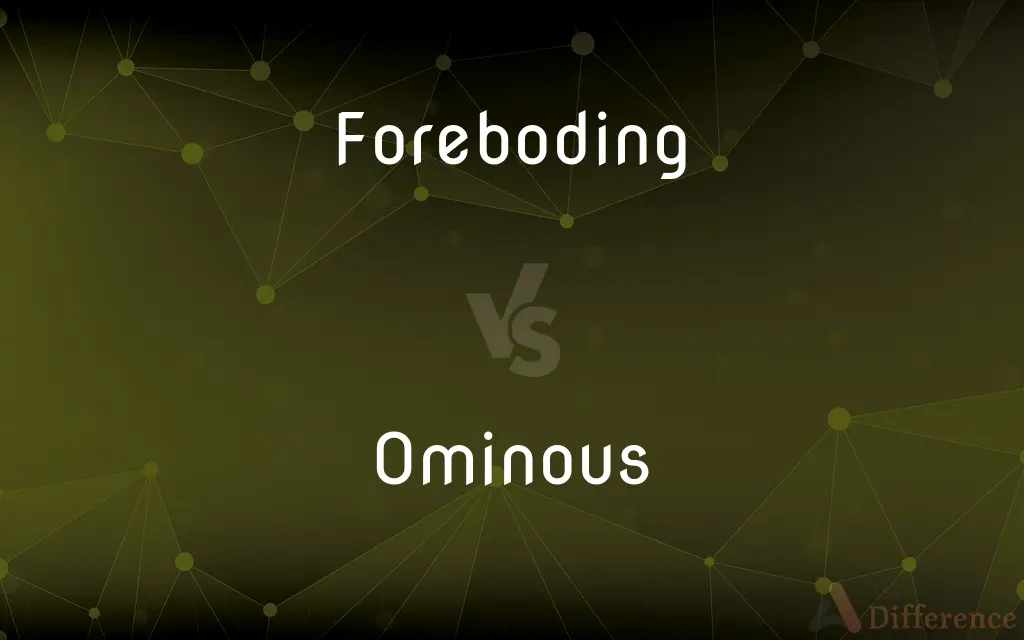Foreboding vs. Ominous — What's the Difference?
Edited by Tayyaba Rehman — By Maham Liaqat — Updated on April 8, 2024
Foreboding refers to a feeling of impending evil or misfortune, while ominous describes something that gives the impression that something bad is going to happen.

Difference Between Foreboding and Ominous
Table of Contents
ADVERTISEMENT
Key Differences
Foreboding is inherently a subjective experience, an internal feeling or intuition that something bad is going to happen. It is closely tied to one's emotions and psychological state, often without a direct, identifiable cause. Whereas, something described as ominous has observable qualities or circumstances that suggest a looming threat or danger, making it more external and objective in nature.
The concept of foreboding centers on anticipation, stemming from an individual's apprehension or anxiety about the future. This anticipation can be vague and not linked to any specific event, but it creates a sense of dread or unease. On the other hand, ominous circumstances or objects possess distinct characteristics that signal potential danger or misfortune to anyone observing them, not just to those with a particular sensitivity or premonition.
Foreboding is often deeply personal and can be triggered by subtle cues in one’s environment or even by one's own memories or subconscious fears. It's a state that reflects the complex interplay of mental and emotional processes. Conversely, ominous signs are generally recognizable by a wider audience, as they consist of tangible, perceivable indicators that are understood culturally or instinctively to be warnings of potential harm.
In literature and storytelling, foreboding is used to describe a character’s intuition or premonition, adding a layer of psychological depth and suspense. Ominous, however, is typically applied to settings, objects, or scenarios to create an atmosphere of tension and impending doom that can be sensed by the audience as well as the characters.
Despite their differences, both terms are connected by their association with fear and the anticipation of negative outcomes. The key distinction lies in the source of these feelings: foreboding is an internal, emotional response, while ominous pertains to external cues that provoke a sense of imminent danger.
ADVERTISEMENT
Comparison Chart
Nature
Subjective feeling or intuition
Observable characteristic suggesting danger
Source
Internal (emotions, psychological state)
External (environment, circumstances)
Trigger
Vague, not necessarily identifiable
Specific, identifiable signs
Perception
Personal and variable
Generally recognizable, universal
Usage in Narrative
Relates to characters’ inner states
Applied to settings, objects, scenarios
Associated With
Anticipation, dread
Warning of danger, tension
Example
A sense of foreboding before a tragic event
Dark clouds as an ominous sign of a storm
Compare with Definitions
Foreboding
An intuition of future misfortune.
The news brought a foreboding of darker times ahead.
Ominous
Portending evil or harm.
The abandoned house had an ominous look.
Foreboding
A sense of impending evil.
The darkening sky filled the sailors with foreboding.
Ominous
Marked by an unfavorable sign.
The raven’s call was an ominous omen.
Foreboding
A feeling that something bad will happen.
She felt a sense of foreboding as she entered the abandoned house.
Ominous
Giving the impression that something bad is going to happen.
The ominous clouds warned of an approaching storm.
Foreboding
An apprehensive concern.
There was a foreboding silence in the room that made her uneasy.
Ominous
Indicating the nature of a future event.
The tone of the meeting was ominous for the company's future.
Foreboding
A premonitory fear.
He couldn't shake off the foreboding before the surgery.
Ominous
Suggesting that something bad will happen.
There was an ominous silence following the explosion.
Foreboding
A feeling that something bad will happen; fearful apprehension
With a sense of foreboding she read the note
Ominous
Menacing; threatening
Ominous black clouds.
Ominous rumblings of discontent.
Foreboding
Implying that something bad is going to happen
When the Doctor spoke, his voice was dark and foreboding
Ominous
Of or being an omen, especially an evil one.
Foreboding
A sense of impending evil or misfortune.
Ominous
Of or pertaining to an omen or to omens; being or exhibiting an omen; significant.
Foreboding
An evil omen; a portent.
Ominous
Specifically, giving indication of a coming ill; being an evil omen
Foreboding
Ominous.
Ominous
Of or pertaining to an omen or to omens; being or exhibiting an omen; significant; portentous; - formerly used both in a favorable and unfavorable sense; now chiefly in the latter; foreboding or foreshowing evil; inauspicious; as, an ominous dread.
He had a good ominous name to have made a peace.
In the heathen worship of God, a sacrifice without a heart was accounted ominous.
Foreboding
A sense of evil to come.
Ominous
Threatening or foreshadowing evil or tragic developments;
A baleful look
Forbidding thunderclouds
His tone became menacing
Ominous rumblings of discontent
Sinister storm clouds
A sinister smile
His threatening behavior
Ugly black clouds
The situation became ugly
Foreboding
An evil omen.
Foreboding
Of ominous significance; serving as an ill omen; foretelling of harm or difficulty.
Foreboding
Present participle of forebode
Foreboding
Presage of coming ill; expectation of misfortune.
Foreboding
A feeling of evil to come;
A steadily escalating sense of foreboding
The lawyer had a presentiment that the judge would dismiss the case
Foreboding
An unfavorable omen
Foreboding
Of ominous significance
Common Curiosities
What does foreboding mean?
Foreboding refers to a strong inner feeling or intuition of future misfortune or evil.
Can a situation be both foreboding and ominous?
Yes, a situation can evoke a foreboding feeling in individuals and also have ominous aspects observable to anyone.
How do authors use foreboding and ominous in literature?
Authors use foreboding to convey characters' internal fears and ominous to describe settings or events that suggest danger.
Do cultural differences affect what is considered ominous?
Cultural backgrounds can influence what signs or symbols are considered ominous.
Can animals sense foreboding or ominous signs?
Animals can react to cues that might be considered ominous, but whether they experience foreboding as humans do is speculative.
Can dreams be foreboding or ominous?
Dreams can be interpreted as foreboding if they evoke a sense of impending doom; ominous would not typically apply as it pertains to external signs.
How does foreboding affect decision-making?
Foreboding can lead individuals to be more cautious or to avoid certain actions or places.
Can buildings or locations be described as ominous?
Buildings or locations can be described as ominous if they appear threatening or suggest danger.
How is something described as ominous?
Something is described as ominous when it has characteristics that suggest it is a sign of bad luck or that something bad will happen.
Is foreboding always related to fear?
While not always explicitly about fear, foreboding is generally connected to apprehension and a sense of impending trouble.
Is foreboding a reliable predictor of future events?
Foreboding is subjective and not a reliable predictor, though it can sometimes precede actual events.
Can weather be described as ominous?
Yes, weather conditions can be described as ominous when they suggest a storm or bad weather is imminent.
How do foreboding and ominous contribute to the mood in storytelling?
They contribute to creating a tense, suspenseful atmosphere, signaling potential danger and engaging the audience’s sense of apprehension.
How can one differentiate between foreboding and anxiety?
Foreboding is a specific anticipation of misfortune, while anxiety is a broader, more generalized state of unease.
Is it possible to feel foreboding without knowing why?
Yes, people often feel a sense of foreboding without being able to pinpoint the exact reason.
Share Your Discovery

Previous Comparison
Docked vs. Moored
Next Comparison
Lucky vs. FortunateAuthor Spotlight
Written by
Maham LiaqatEdited by
Tayyaba RehmanTayyaba Rehman is a distinguished writer, currently serving as a primary contributor to askdifference.com. As a researcher in semantics and etymology, Tayyaba's passion for the complexity of languages and their distinctions has found a perfect home on the platform. Tayyaba delves into the intricacies of language, distinguishing between commonly confused words and phrases, thereby providing clarity for readers worldwide.
















































